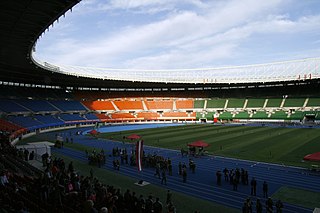
The 1989–90 European Cup was the 35th edition of Europe's premier club football tournament, the European Cup. The final was played at the Praterstadion in Vienna on 23 May 1990. The final was contested by Italian defending champions Milan and Portuguese twice former winners Benfica. Milan successfully defended their title with a 1–0 victory, securing their fourth European Cup trophy. Milan remained the last team to successfully defend their trophy until Real Madrid did it again in 2017. Arsenal were denied a place in the competition, as this was the last year of a ban from European competitions for English clubs following the Heysel Stadium disaster of 1985.

The 1996–97 season of the UEFA Cup Winners' Cup was won by Barcelona after beating holders Paris Saint-Germain in the final. It was the last of four occasions that the Spanish club won the tournament.
The 1985–86 European Cup Winners' Cup was won by Dynamo Kyiv in the final against Atlético Madrid. It was their second title in the competition, and first since 1975.
The 1994–95 UEFA Cup was won by Parma on aggregate over Juventus. Internazionale were the defending champions with a wild card, but were knocked out in the first round by Aston Villa.
The 1989–90 season of the European Cup Winners' Cup was won for the only time by Sampdoria in the final against Anderlecht, 2–0 at Nya Ullevi in Gothenburg, on 9 May 1990. They went on to win 1990–91 Serie A, also being runners-up in the 1991–92 European Cup and in the 1988–89 European Cup Winners' Cup. English clubs were still banned from Europe following the Heysel Stadium disaster, meaning Liverpool missed out on a place, but would have a representative again the following season.
The 1992–93 season of the European Cup Winners' Cup was won by Parma in the final against Antwerp. Both were first time finalists in the competition, and Antwerp were the last Belgian side to reach a European final up to the present day. The competition had more entrants than ever before due to the break-up of Yugoslavia and the Soviet Union, resulting in many new countries eligible to enter the winners of their own cups into the competition. Israel, the Faroe Islands and Liechtenstein were also represented for the first time.
The 1987–88 UEFA Cup was the 17th season of the UEFA Cup, the secondary club football competition organised by the Union of European Football Associations (UEFA). The final was played over two legs at the Estadi de Sarriá, Barcelona, Spain, and at Ulrich-Haberland Stadion, Leverkusen, Germany. The competition was won by Bayer Leverkusen of Germany, who defeated Español of Spain on penalty kicks with an aggregate result of 3–3.
The 1986–87 UEFA Cup was the 16th season of the UEFA Cup, the third-tier club football competition organised by the Union of European Football Associations (UEFA). The final was played over two legs at the Ullevi, Gothenburg, Sweden, and at Tannadice Park, Dundee, Scotland. The competition was won by IFK Göteborg of Sweden, who defeated Dundee United of Scotland by an aggregate result of 2–1 to claim their second title.
The 1985–86 UEFA Cup was the 15th season of the UEFA Cup, the third-tier club football competition organised by the Union of European Football Associations (UEFA). The final was played over two legs at the Santiago Bernabéu Stadium, Madrid, Spain, and at the Olympiastadion, West Berlin, West Germany. For the second year in a row, the competition was won by Real Madrid of Spain, who defeated Köln of West Germany by an aggregate result of 5–3.
The 1984–85 UEFA Cup was the 14th season of the UEFA Cup, the third-tier club football competition organised by the Union of European Football Associations (UEFA). The final was played over two legs at the Sóstói Stadion, Székesfehérvár, Hungary, and at the Santiago Bernabéu Stadium, Madrid, Spain. The competition was won by Real Madrid of Spain, who defeated Videoton of Hungary by an aggregate result of 3–1 to claim their first UEFA Cup title.
The 1982–83 UEFA Cup was the 12th edition of the UEFA Cup, the third-tier club football competition organised by UEFA. The final was played over two legs at the Heysel Stadium, Brussels, Belgium, and at the Estádio da Luz, Lisbon, Portugal, between Anderlecht of Belgium and Benfica of Portugal. Anderlecht won by an aggregate result of 2–1 to claim their first and only UEFA Cup title.
The 1985 season in Swedish football, starting January 1985 and ending December 1985:
The 2010 FIFA World Cup qualification UEFA Group 1 was a UEFA qualifying group for the 2010 FIFA World Cup. The group comprised 2006 fourth-place finishers Portugal, along with Sweden, Denmark, Hungary, Albania and Malta.
Standings and results for Group 5 of the UEFA Euro 1980 qualifying tournament.
The 2006 FIFA World Cup qualification UEFA Group 8 was a UEFA qualifying group for the 2006 FIFA World Cup. The group comprised Bulgaria, Croatia, Hungary, Iceland, Malta and Sweden.
Standings and results for Group 5 of the UEFA Euro 1984 qualifying tournament.
Standings and results for Group 2 of the UEFA Euro 1988 qualifying tournament.
The qualification matches for Group 1 of the European zone (UEFA) of the 1994 FIFA World Cup qualification tournament took place between August 1992 and November 1993. The teams competed on a home-and-away basis with the winner and runner-up claiming 2 of the 12 spots in the final tournament allocated to the European zone. The group consisted of Estonia, Italy, Malta, Portugal, Scotland, and Switzerland.
The 2009 season in Swedish football, starting January 2009 and ending December 2009:
The 2003–04 UEFA Champions League qualifying rounds decided 16 of the 32 teams which played in the group stage. All times are CEST (UTC+2).

